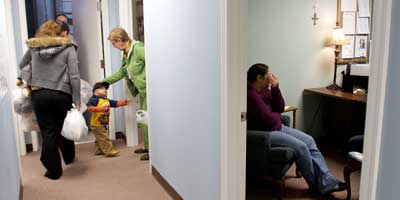
 As the social service agency of the church, Catholic Charities offers programs designed to help build a world of greater charity, justice and peace. In the Diocese of Charleston those services include senior care, disaster relief, immigration, adoption, prison ministry, food pantries and more. The annual collection will be May 13 in most parishes.
As the social service agency of the church, Catholic Charities offers programs designed to help build a world of greater charity, justice and peace. In the Diocese of Charleston those services include senior care, disaster relief, immigration, adoption, prison ministry, food pantries and more. The annual collection will be May 13 in most parishes.
When Emily Guerrero first started working for the Diocese of Charleston’s Immigration Services, she had a hard time leaving her work at the office.
The stories she heard each day of genocide and abuse haunted her thoughts.
“I had to remind myself I was doing something positive for them, to help them move forward, to get out of their situation,” she said.
Guerrero, an attorney, is now supervisor of the coastal office, which operates under Catholic Charities.
She’s been there for over seven years, and has helped thousands of people find their way to a better life.
The stories she remembers best are those with a positive outcome, when clients let her know how they’re doing and how thankful they are.
They come from across the globe, bearing scars emotional and physical that are far heavier than their few belongings.
Take Mindy, an immigrant from one of the many war-torn countries in Africa. She belonged to a tribe that practices female genital mutilation and forced marriages. It happened to her when she was seven, with unsterilized knives and no anesthesia.
She came to the United States on a visitor visa to work. Unable to bear the thought of returning, she sought asylum based on gender persecution.
Guerrero said asylum cases are notoriously difficult to win, but Mindy was an intelligent, articulate woman with a mountain of evidence to support her. She earned asylum, then obtained a green card, and is now a U.S. citizen.
“She got to pick her own mate, fall in love and have her own story,” Guerrero said.
Many of her clients are from Haiti, which was devoid of opportunity even before the earthquake of 2010 decimated the country.
“There are just no opportunities there,” Guerrero said. “I’ve had clients from Haiti tell me if they were deported and had to go back, they’d kill themselves rather than go back.”
Jean-Paul is from Haiti. He was working in the United States on a visitor visa, sending everything he could home to keep his family from starving, when the earthquake hit. His mother was killed — one of more than 300,000 who died under crumbled buildings — and his three sons were left homeless.
Jean-Paul was torn between a desire to see his family and the knowledge that the only way to help them was to stay here and continue working.
Immigration Services helped him receive the temporary protective status offered by the United States so visiting Haitians wouldn’t be forced to return to a ruined country.
“This is the only way for him to provide any kind of life for his children,” Guerrero said.
A graduate of USC’s law school, she operates one of three immigration offices. Catholic Charities also has one in Greenville, and a brand new location on Hilton Head Island.
“There’s such a high demand for our services, we’re in the process right now of expanding across the state,” Guerrero said.
She added that they plan to go to Myrtle Beach next, followed by Columbia or Aiken.
Wherever they are, clients will find them.
They receive so many visits and phone calls that by mid-day, the oldfashioned answering machine in her office usually shuts itself off, unable to absorb even one more message.
A large portion of them are from abused women. In these cases, they can usually seek a green card under the violence against women act.
Guerrero said it always follows a pattern of escalating violence until finally, in fear for her life, the woman flees.
Tracy from Myanamar was one of those women. She came on a fiancé visa, and was married in California. What she thought would be a better life soon devolved into emotional, physical and sexual abuse.
Desperate, she fled across the entire country, landing in South Carolina, in a chair across from Guerrero, where she finally found safety.
Now Tracy is a sushi chef and has applied for U.S. citizenship.
The stories Guerrero hears are always sad, she said, but they no longer haunt her because she knows her ministry will help fi nd a happy ending.
EDITOR’S NOTE: The names of immigrants in the story have been changed to protect their privacy.
